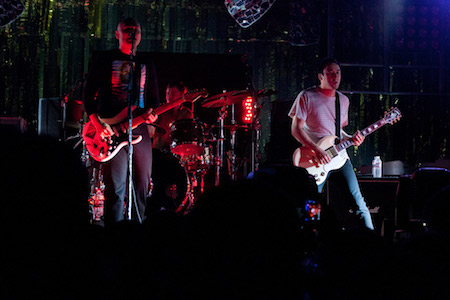We featured Smashing Pumpkins guitarist Jeff Schroeder in the November issue of KoreAm. Aside from  recording music and touring with the band, Jeff is also finishing his graduate studies in comparative literature at UCLA.
recording music and touring with the band, Jeff is also finishing his graduate studies in comparative literature at UCLA.
He took time out of his busy schedule to share some of his favorite avant-garde Asian American works of fiction and poetry.
Crossings by Chuang Hua (1968)
Crossings is one of the earliest works of Asian American experimental writing and is the only novel Hua published. Influenced by William Faulkner, Virginia Woolfe and Marcel Proust, it chronicles the protagonist’s numerous travels across borders of both space and time. I’ve read Crossings many times, and with each reading, I discover new themes. I find this book important because it provides a necessary artistic representation of hyphenated identity that is different from the more sociological bent of other forms of scholarly writing.
Dictée (1982) and Exilée/ Temps Morts (2009) by Theresa Hak Kyung Cha
Upon its publication in 1982, Dictée was overlooked by the mainstream literary press and scholars of Asian American literature. The book—which mixes poetry, fiction, historical writing and visual art to explore the themes of war, immigration and transnational identity— experienced a renaissance in the mid-‘90s and today is considered the most well-known work of avant-garde Asian American writing. Exilée/Temps Morts is a more recent collection of the late Cha’s out-of-print writings. Her passages on the acquisition of new language, explorations of the Korean War and interest in the French avant-garde strongly connect with my interests.
The Bounty by Myung Mi Kim (1996)
Kim’s first collection of poetry, Under Flag (1991), can be seen in many ways as a poet’s response to Theresa Cha’s Dictée. In The Bounty, Kim develops her own trajectory, most notably the theme of language. Seen as the primary tool in which we situate ourselves in the world, Kim’s explorations into the historical and social construction of language take her readers on a frag- mented and dream-like journey. Kim’s poetry forces me to think even deeper about the way language constructs our social reality and how we shouldn’t view words as static enti- ties, but as something continually in flux.
The Book of Salt by Monique Truong (2003)
The Book of Salt is not so much avant-garde in style, but historically explores one of the most important sites of avant-garde ac- tivity: Paris. The novel retells the history of early 20th-century Paris from the perspective of the Vietnamese immigrant chef of Gertrude Stein and Alice B. Toklas, two of the most important figures of Euro-American modernism. Upon first reading this book, it re- minded me of why I began to seriously study literature. It’s a novel written by an Asian American writer about a history where Asians and Asian Americans are completely left out or forgotten.
I-Hotel by Karen Tei Yamashita (2010)
I-Hotel is a landmark in Asian American writing. In this novel of 600-plus pages, Yamashita revisits the origins of the Asian American movement starting in the late 1960s. Intellectually rigorous and hilariously funny, Yamashita demonstrates why she is one of the most important writers of our generation. The book explores the often contentious relationship between art and politics, which is one of my primary interests as an artist and intellectual.
This article was published in the November 2011 issue of KoreAm. Subscribe today!
[ad#bottomad]















